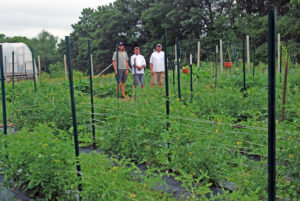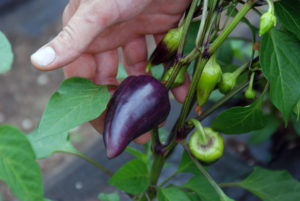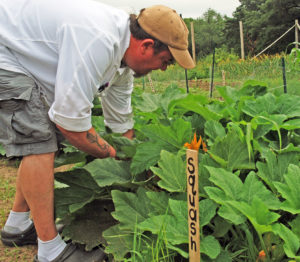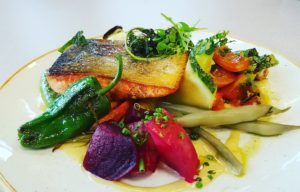
First we eat, then we do everything else.–MFK Fisher
Swatting away mosquitoes one July morning in the garden on the Promega Madison, WI, campus, Senior Culinary Manager Nate Herndon leans down and pulls back the leaves of a squash plant, revealing the bright yellow flowers that in a couple of hours will highlight a seasonal special on the lunch menu at one of the company’s cafeterias: green onion-cream cheese stuffed fried squash blossoms served on a grilled jerk pork tostada with black beans and cilantro sauce. Herndon explains that dishes made from scratch with high-quality, locally sourced (and sometimes unexpected) ingredients are the rule at Promega Madison kitchens, where it’s not uncommon to find entrees like house made ramp garganelli with oyster mushrooms and asparagus, braised beef ragu with house made buckwheat parpadelle pasta and baby kale, or fried perch tacos.
Food is an extension, a daily demonstration, of our overall commitment to sustainability, the community and employees
Many companies are realizing the benefits of upscaling their corporate cafeteria offerings. Some are engaging employees with ever-changing theme lunch menus or energy drinks on tap. Others are echoing the popular farm to table movement. But Herndon explains that Promega’s sensibilities surrounding the importance of food goes way beyond simply following popular trends.
“Food is an extension, a daily demonstration, of our overall commitment to sustainability, the community and employees,” says Herndon. “We serve food that is interesting and exciting and draws employees to eat together, spurring conversations that create deeper personal and professional connections. We support our local farmers. We’re friends with them so we know where our food comes from. We know that Kristen grows the most amazing beets so we honor that and make sure we don’t waste any of that ingredient and also showcase it in the best way possible.”

For instance, Herndon describes working with local farmers to integrate a surplus of a particular crop into menus so delicious seasonal produce does not go to waste. An abundance of tomatoes becomes a delightful gazpacho. (Check out the recipe below!) Promega also purchases whole animals that culinary team members butcher and process themselves in order to utilize every cut of meat and plan menus accordingly. An amazingly tasty Pastrami Beef Short Rib Panini ended up on the lunch menu, thanks to this practice. Seeking a sustainable seafood option, Promega also recently began to source salmon and other fish directly from costal fisherman through a company called Sea to Table. This summer, Promega employees can enjoy a lunch of wild sockeye salmon that was swimming in Canada’s Taku River the day before.
“We want to do justice to what the ingredient is,” says Herndon, so he explains that Promega only uses ingredients that are in season. Implementing this plan throughout the long Wisconsin winter means preserving produce by freezing, canning, vacuum packing and pickling. It also means using lots of root vegetables and working with local farmers who grow winter crops.

Locally sourced ingredients can’t get much closer than those obtained from the ¾ acre Promega culinary garden known as “Bluebird Farms.” Tucked in a quiet clearing on the wooded Madison campus, the garden supplies Promega kitchens with a bounty of seasonal produce such as peppers, cucumbers, corn, herbs, and squash. Beans and other vegetables grow out of straw bales that line the garden’s periphery, and rows of several varieties of tomato plants reinforced with twine trellises occupy almost half of the garden, from which Herndon expects to harvest some 1800 pounds of tomatoes this year. A recent harvest of fresh garlic resulted in 250 pounds hung to dry in a now intensely aromatic hoop greenhouse that sits at the end of the garden. (The culinary crew estimates it will take only about three months to go through all that garlic. Watch out co-workers!)
The garden was Herndon’s idea when he started at Promega more than six years ago. “It started small and just grew and grew,” he says. Promega brought in a part-time gardener this season to help out, but culinary team members also play an active role in garden maintenance and harvest. It’s not uncommon to see them making daily runs to the garden to pick kale or fresh herbs for an afternoon catering event or the daily special in one of the Promega cafeterias. Team members even built the greenhouse, a garden-side washing station and a compost sifter.

The team’s passion for ingredients reflects in the overall dining experience, says Herndon. “It’s not just ‘Here’s your sandwich.’ To someone else it may be ‘taco day’ but for us that day represents months of work, so we take a lot of pride in serving it.” He describes planting peppers in the spring, butchering specific cuts of meat for the dish, and harvesting cilantro from the garden a couple of hours before the dish is served.
“There is a respect for each ingredient and therefore you think about how you can get the most from it,” says Herndon.
Luckily for Promega Madison employees, and others who have the pleasure of eating Promega culinary offerings at one of the many catered events hosted on the corporate campus, a commitment to sustainability, community and employees translated through food leads to some amazingly delicious outcomes.
Bonus! Herndon describes his personal culinary style as “vegetable forward” featuring anything from the garden. He says homemade pasta is a wonderful backdrop to make all types of seasonal vegetables the star of the dish. (But, he also quickly adds, “I love meat.”) Here Herndon shares one of his favorite summer recipes: gazpacho.
Latest posts by Karen Burkhartzmeyer (see all)
- Sustainability Day: It’s not just for the last Wednesday in October - October 26, 2022
- Adapting Holiday Traditions: COVID, Customs and Cookies at Promega - December 16, 2020
- Supporting Caregivers, Colleagues, and Neighbors - November 24, 2020


As a former employee of Promega I can say I greatly miss the amazing food that Nate and his crew put together for us!!